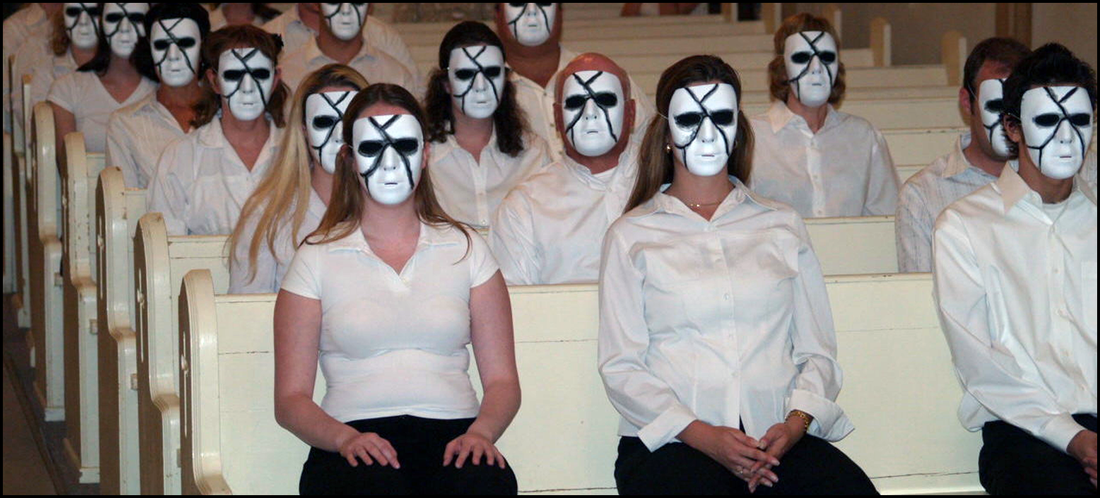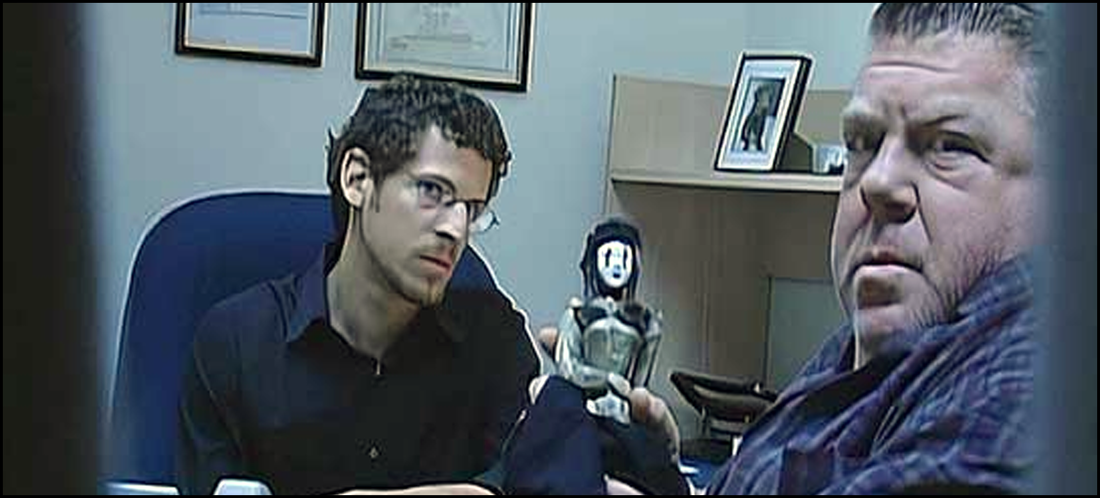Context – when done right – helps set the stage. Context matters, and it matters more than damn near anything else. Context gives me a clear time and a clear place with which these events are about to occur. Context introduces me to the characters, places, and circumstances required for me to fully appreciate the tale as it unfolds. While it’s safe for any storyteller to withhold a bit of context in order to, say, deliver the narrative’s bigger surprises, then I need to be amply rewarded for exercising such patience, for waiting for the pieces to be put together in such a way that I can finally say, “Oh, yes, I see it now.” So without proper context, there really is no story worth its weight in gold.
Still, a lot of films have tried to achieve big things by sticking small; and – in that respect – a little something something like Bryan Loves You (2008) probably passed by a lot of folks’ radar without a second look. It doesn’t have a lot of bells and whistles. In fact, being one of those ‘found footage’ features – as it was advertised – probably didn’t do the Horror/Drama any favors: 1999’s The Blair Witch Project was nearly a decade old, and the resulting knock-offs, imitators, and do-overs had likely drained the market dry of the potential to do good (much less great) box office by that time.
That’s a shame because … well … because Bryan Loves You. Shouldn’t you love him back? This independent ‘investigation’ into a probable cult development has a wealth of good ideas in it (some not so good), though I’ll honestly assert right up front that it could’ve used a bit of its own makeover. As you’ll find below, it’s really two films disguised as one, meaning that each half needed to be damn near perfect in order to light the kind of critical fire it needed to truly break through the traditional noise of our entertainment culture. Alas, it’s imperfect – like those of you who don’t love Bryan – but now that it's available on Blu-ray maybe you’ll give it a second chance?
If not for you … then how about … for Bryan?
(NOTE: The following review will contain minor spoilers necessary solely for the discussion of plot and/or characters. If you’re the type of reader who prefers a review entirely spoiler-free, then I’d encourage you to skip down to the last few paragraphs for the final assessment. If, however, you’re accepting of a few modest hints at ‘things to come,’ then read on …)
“In the early 90’s, a 32-year-old psychotherapist Jonathan began to suspect that his small Arizona community was being taken over by a homicidal religious cult known as ‘Followers of Bryan.’ What starts as an innocent inquisitiveness quickly turns into a violent and harrowing fight for his freedom … and survival.”
Though there’s a bit more information on the slipcase, the above works best because I think that there’s some otherwise uneven context provided that I’m gonna wax on a little about. Again, this isn’t an appraisal of quality, per se, but rather it’s an attempt to clarify this story as presented.
Much of what I’ve read about Bryan Loves You indicates that it’s supposed to be a ‘found footage film,’ a unique sub-genre of storytelling for which I’m always hounded because I appreciate it much more than the next blogger. (What can I say? Sue me.) For what it’s worth, I think that’s wildly inaccurate – Bryan is NOT found footage – mostly because the breadth of this particular story has been edited together from a vast, vast, vast different number of cameras. True found footage relates one story found on a single recorder; this way, nothing can be augmented by, excised from, or added to in any way legitimately, and the audience is presented a story ‘as is’ fresh from the eyes of whoever taped it. While that may seem like a small quibble to some, I introduce it because it’s going to factor into my overall impression of the film in a moment. (Bear with me.)
We’re introduced to the material by a nameless narrator (played by Tony Todd) who prefaces the film solely for the case of serving viewers with a warning: what follows, he says, is very, very, very disturbing.
Well …
The problem here is that it’s not. It isn’t all that disturbing. Heck, it’s not even all that alarming when positioned in the timeframe of the early 90’s, from which this tale is allegedly set. Bryan offers little to nothing by way of, say, controversial subject matter (it deals essentially with cults and brainwashing); and while there may be some suggestions of violence and bloodshed very little of that is captured on film. So what exactly are we supposed to have found so startling in all of this? It’s entirely unclear, nor is it ever expanded upon in any meaningful way. As such, Todd’s warning – in hindsight – felt superfluous and (dare I say?) manipulative … much in the same way the Followers of Bryan conduct themselves. Does that make this a release endorsed by them? If they’re so secretive, why would they endorse this? And if they’re endorsing this, does that mean they’re not as secretive as Landau’s script would lead us to believe?
Therein lies the rub when dealing with stories that only dabble with messaging instead of going all-in: typically, they leave out context, allowing the viewers to watch, digest, and make up their own mind about what truly went on here and ascribe whatever value they want to it. As a viewer, I always hate having to interpret the whole cloth much less the individual scenes; that’s because I’d rather be given something with a message than without because I’m otherwise free to plug any ol’ theory into the open space … and I’ve always felt that’s a disservice to storytellers and audiences both. Have something to say … because, otherwise, why are you speaking to me?
Yes, yes, yes: I’m still free to make up my own mind on the subject matter, but the message of the film is the province of the filmmaker. It’s a fine line, but it’s still there.
For example, we establish in the first half that there’s a probability one can be ‘turned’ into a follower by being bitten by one of the followers: high school teacher Linda (Tori King) gets chomped on by one of her students, and a few scenes later Jonathan (Landau) and Nicole (Candy Stanton) are attacked by the now-crazed woman as a result of going to her home to check on her safety. Also, Candy eventually gets abducted by the church and converted; though we’re not shown the particulars of her conversion, a rabid believer is presented to her while in custody, reminding us of Linda’s earlier assault. So if this secret belief system can be forced upon a non-believer through infection, why then is the audience taken through the second half wherein Landau’s tale suggests he needs to accept Bryan into his life and celebrate this ascension consciously? Why not just have one of the followers bite him and … problem solved?
I’ve seen this happen all-too-often in films that try to lean in the direction of, say, conventional Horror when in reality what they’re founded on is a much narrower subset of a particular genre, like psychological Horror. Often times, storytellers will insert elements of other ideas into their films as a way to widen the possible audience; this isn’t to suggest that the additions weren’t planned but I’d argue they weren’t central to whatever the original plan could have been. In my estimation, Bryan works better in its second half – it’s Kafkaesque exploration of a world not quite normal, not intentionally abnormal, probably not paranormal – because I’m drawn into moments of character conflict. People matter; so the mindless zombies who propagate some nebulous church mean nothing to me on a personal level. Now, had there been a more informative explanation behind the Followers of Bryan, I could easily have felt differently … but being left with having to respond to this story as presented I only have more questions about the cult than I need. In the end, all I can care about is Jonathan; the sect becomes an inconsequential sideshow act needing a better foundation.
Breaking the two halves into separate projects could’ve made for a more rewarding experience. In fact, they could’ve been related flicks – two yarns spun in the same universe, much like the Marvel storytellers do in big budget fashion. (If small, independent dramas are your thing, then writer/director Gonzalo Calzada kinda/sorta did this with his Nocturna: Side A and Nocturna: Side B features, though I found some of that project suffering from predictable bloat.) The set-up – the ‘found footage’ – could even have been added to with perhaps a faux documentary looking back on the cult, its effects on the area, etc. This would’ve left the second act to be truly a second act, and I think the overall impact might have been greater.
Maybe Landau is looking to do a sequel? “Bryan Loved You: A Look Back”? That could be cool.
Still, kudos are deserved for big things coming in small roles. Bryan dishes out a handful of supporting players – many of whom are known quantities like Tony Todd, George Wendt, and Tiffany Shepis (who makes a great good-looking version of One Flew Over The Cuckoo’s Nest’s ‘Nurse Ratchet’) – and they hit their marks admirably, though I’m left with questions due mostly to the lack of context on too much in here. If that near-miss was intentional, then it was soundly achieved. If it was unintended, then a change would do you good … but not the change they tried to force on poor Jonathan!
- An all-new audio commentary from Landau;
- The 2008 commentary from Landau, some cast members, and a host;
- Lengthy interviews with stars George Wendt, Tiffany Shepis, Daniel Roebuck; and Brinke Stevens; and
- An all-new theatrical trailer.
Recommended. As I often warn readers, low-budget films are most definitely not for everyone; I’ve found that I tend to enjoy them much more than most, and that’s because – in my humble opinion – they’re a bit rawer than studio fare, meaning there’s a bit more to chew on, even though the meat might have a surplus of gristle. My chief complaint with Bryan Loves You is that it kinda/sorta never quite decided what it wanted to be – the narrative is clearly a mash-up of two different ideas with a very weak bridge between them – and, thus, it left me wanting to know more context in order to understand what I just finished. The 2022 commentary helps greatly … but I still had questions.
In the interests of fairness, I’m pleased to disclose that the fine folks at MVD Visual provided me with a complimentary Blu-ray of Bryan Loves You (2008) by request for the expressed purposes of completing this review; and their contribution to me in no way, shape, or form influenced my opinion of it.
-- EZ





 RSS Feed
RSS Feed